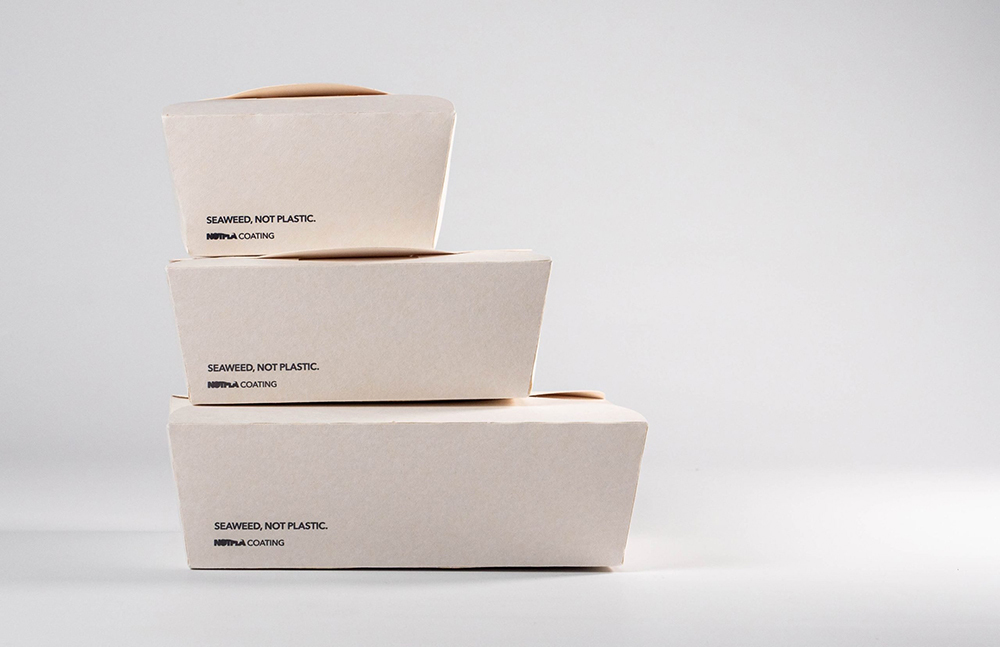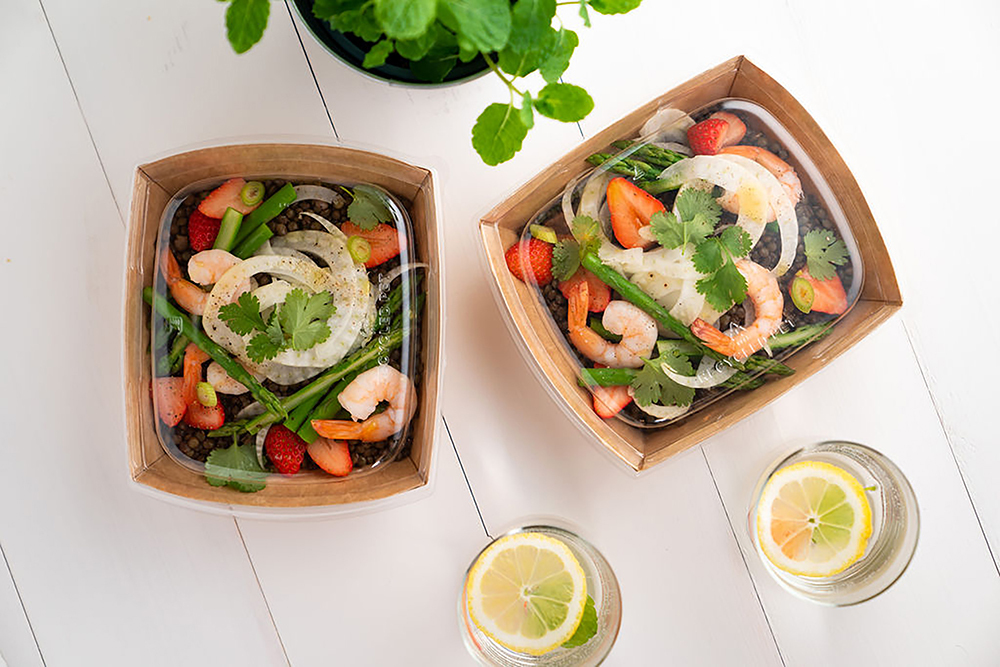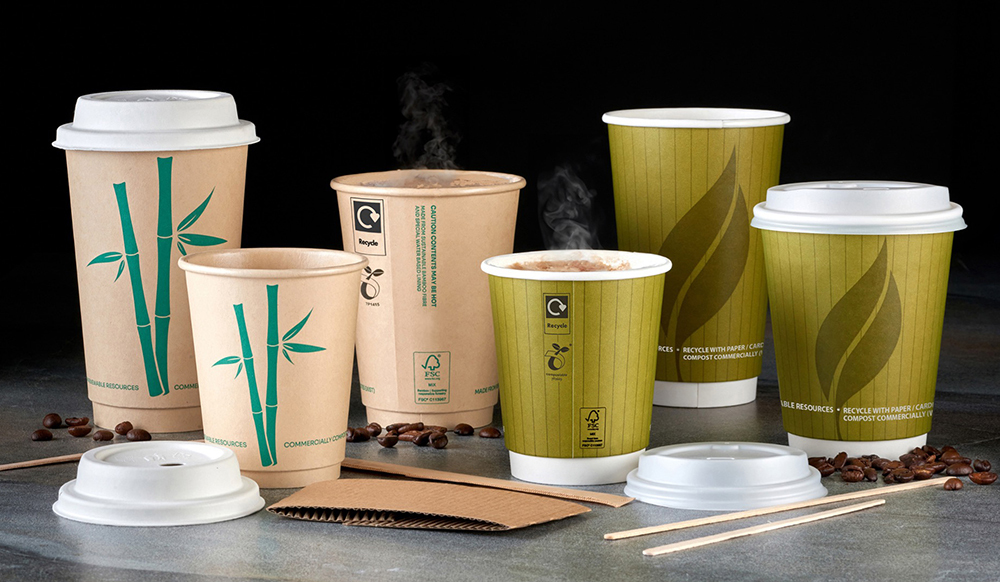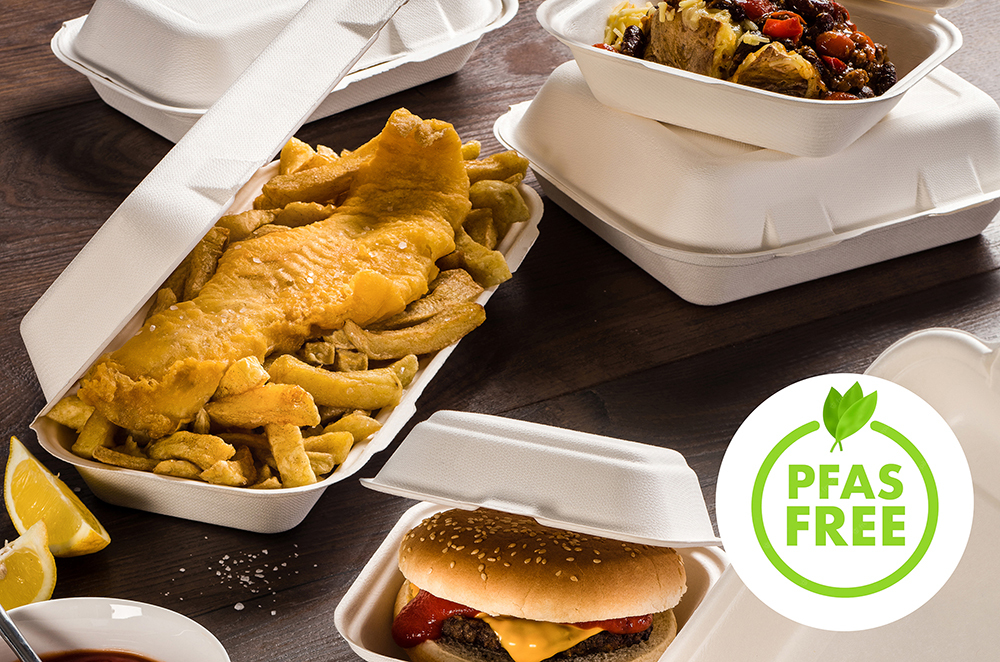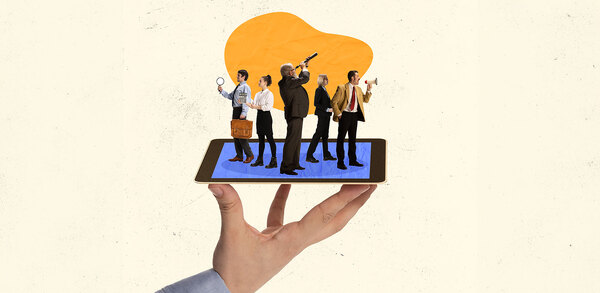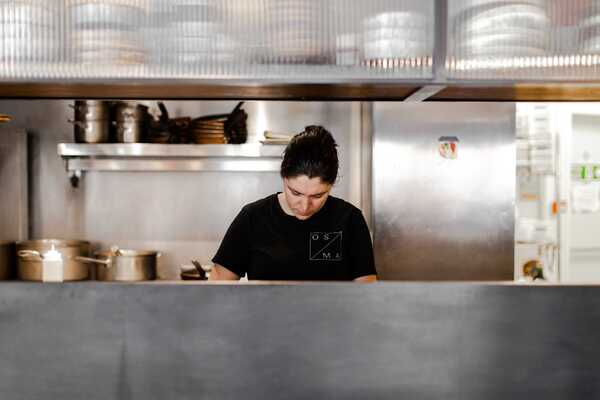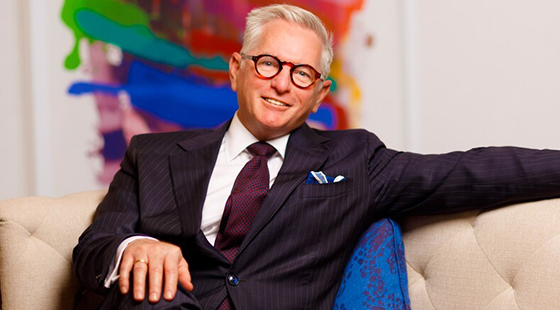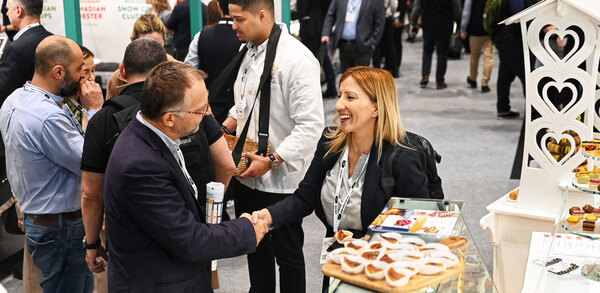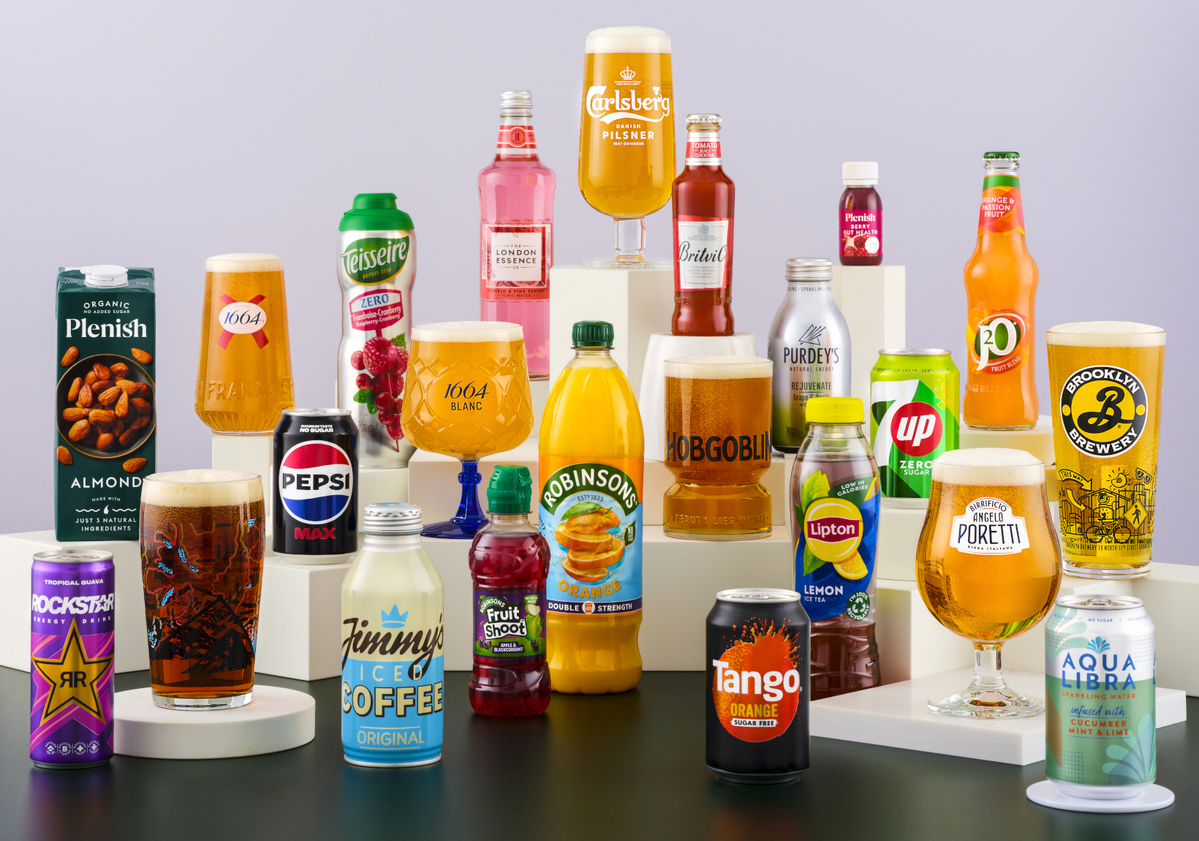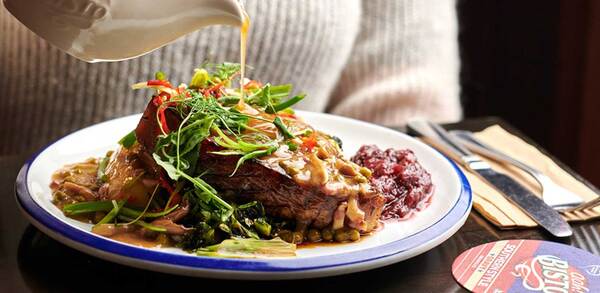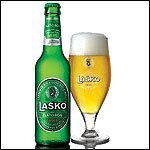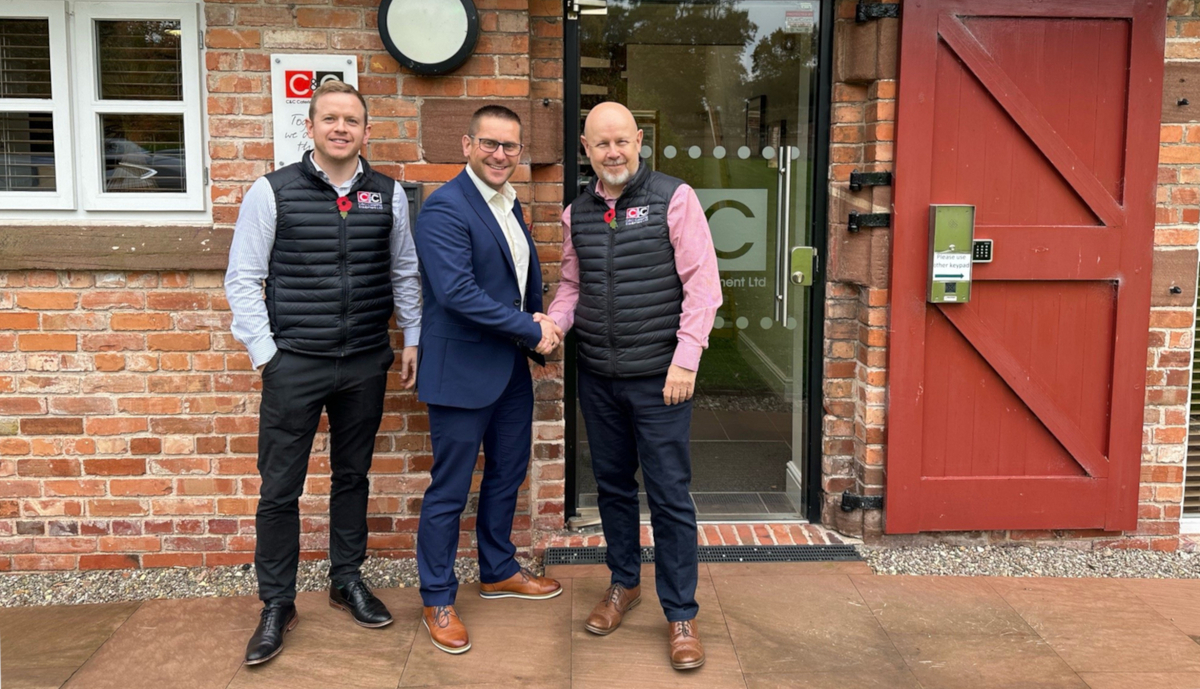Why reusable packaging is on the rise in hospitality
With an eye on sustainability, the market for reusables is booming, with everywhere from football stadiums to royal palaces reusing and recycling
It’s Saturday afternoon and Joe Bloggs is at the CBS Arena to see his beloved Coventry City. Keen to ensure he doesn’t miss a second of the best Sky Blues team in years, he arrives early and, with a half-hour to spare, scoffs a hotdog (delivered on a compostable Notpla tray), washing it down with a piping-hot cup of tea (served in a recyclable cup with lids from Vegware).
At half-time, with Coventry in complete control against a hapless Rotherham side, Bloggs decides to celebrate with a pint (served in a Just Peel compostable paper cup). He’s so happy, in fact, that he also has a pie, which he cuts up, somewhat awkwardly, using the wooden cutlery provided (also from Vegware).
Everything Bloggs eats – indeed, everything available at the CBS Arena, which hosts not just Coventry City but also concerts and events from Bryan Adams to Comic Con – is now packaged sustainably, according to Tom Davies, head of supply and sustainability lead at the stadium.
“Everything we are using is either fully recyclable, sustainable or compostable,” he says. “None of it goes into landfill.”
The CBS Arena is undeniably one of the greenest stadiums in the country, having also partnered with carbon footprint management solution Skoot to encourage customers to offset their carbon emissions with donations that will go towards tree planting and ocean plastic removal.
Impressive – but it’s never been easier to use sustainable options when it comes to packaging. There’s huge energy and innovation in the sector now, with demand high and quality growing by the day. The plastic packaging tax, introduced in April 2022, has forced producers to investigate more sustainable options, says Davies, adding: “That’s changing the market, making everything come down in price.”
Indeed, it’s getting to the stage where those places that don’t use sustainable packaging are the odd ones out. So how do you do it, and what are the best options on the market?
Sky blue and green
Coventry City are having a great season, into the FA Cup semi-finals and challenging for promotion to the Premier League. This energy is being replicated off the pitch, with a drive towards sustainability that shows exactly what is possible in the modern day. Everyone who works at the CBS Arena is part of this mission, according to Davies.
“We have a sustainability committee that meets every six weeks, which is voluntary, but we’ve got a good variety of people from different departments who want to be involved,” says Davies. “We discuss what we’re doing and how we’re going to get there. We’re spending a lot of time at the moment talking about our waste streams and making sure they’re as sustainable as possible.”
That focus is appreciated by customers, he says, although to differing degrees: “It’s 50/50. With our conference and events side, it’s massively important. We’ve got event organisers who won’t look at us unless we’re sustainable. A lot of football fans are interested, too, but many are just here to watch the football, and that’s fair enough.”
The growth in options means deciding which products to use is not always straightforward. What if a sustainable item doesn’t work for one reason or another? Davies says they had this problem with One, the reusable plastic cup that is used and then returned to dedicated bins. A large proportion of the stock was going missing or being broken, despite copious messaging and special bins for the cups. “It’s a fantastic idea, a fantastic concept, but it didn’t quite work for us,” he says.
The replacement is a cup made with paper, which is also not quite perfect but, Davies says, they’ll aim to improve that, to find another solution that works better in terms of both sustainability and ease of use. That’s the key trade-off when it comes to sustainable packaging: it may be helping to save the earth, but is it as good an experience as the alternative?
“I sincerely hope so,” says Davies. “I think sustainability has always been seen as red tape in this country: you’ve got to do this; you’ve got to do that. We’ve tried our very best to make this a smooth transition for our customers, to ensure they don’t have to do extra work. We’ve got waste streams across the building now. We haven’t made [customers] pay for the new packaging; we’ve absorbed that cost.
“If more places can make the customer part of the journey without making them pay for the journey, the smoother things will be.”
From city to palace
Sustainable packaging is now everywhere. At Blenheim Palace, single-use cups have been eradicated by providing reusable cups that come with a £2 deposit. Once visitors have finished their drink, the cup can be returned to one of numerous on-site return points, and the deposit is refunded to the visitor’s digital wallet. The scheme, run in partnership with sustainable drinkware specialist Circular&Co, is a key part of Blenheim’s sustainability drive, according to David Green, the venue’s head of innovation: “We serve 400,000 hot drinks every single year and have the ambition of being carbon-neutral by 2027, so the introduction of our returnable cup scheme is a major step towards that goal. The main benefit of the scheme is that we expect to eradicate 30 tonnes of carbon every single year as a result.”
One of the difficulties operators have when embarking on sustainability is understanding and measuring their environmental impact. A new partnership between My Emissions, which produces software to measure and reduce the environmental impact of food, and Ecologi, an all-in-one climate-action platform to enable food and beverage companies to understand their products’ and dishes’ carbon impact, aims to solve this problem.
Matthew Isaacs, co-founder at My Emissions, says: “Our partnership with Ecologi is a bold step towards a more sustainable food future. By embracing our expertise in food sustainability, and leveraging Ecologi’s leadership in climate action, we are not only reducing the environmental impact of food for businesses but also helping them access high-quality climate funding as part of their decarbonisation plans.”
Wash and go
There are a dizzying variety of sustainable products now available. Meiko, for example, offers washing solutions for reusables, which can wash tens of thousands of reusable cups or containers, and incorporates drying. Rieber, meanwhile, produces the reusable eatTainable system, which combines microwave-safe stainless steel gastronorm containers and QR labels that identify the food, date and time of manufacture and can also link to the user and site via cashless vending.
Snap2Go packaging is a new product from Sabert where the stackable and nestable base is made from Forest Stewardship Council-certified paper, and the rPET lid contains a guaranteed minimum 50% of recycled content. Alex Noake, UK and Ireland managing director, says: “We recycle 100% of production waste, use green energy, invest in efficient production tools, optimise stacking to increase storage and transport space, while also implementing several measures that demonstrate our deep commitment to minimising the impact of our operations on the environment.”
Italian brand Pinti Inox has come up with an innovative cutlery option, Use & Reuse. Made from a thin stainless steel sheet, it can be reused but is also 100% recyclable after one use. Paula Sherlock, managing director of Pinti Inox’s UK supplier, Signature Food Service Equipment, says: “Pre-packaged in a paper single-setting pack, Use & Reuse is available as a pre-washed knife, fork, and spoon set, ready to be used immediately – for both hot and cold dishes – which makes it the perfect accompaniment for on-the-go and self-service meals.”
Aluminium is another good metal option, according to Jane Aukim, marketing manager at i2r, manufacturer of recyclable aluminium foil packaging containers. “When you think of aluminium food packaging your mind may be brought to ‘low-quality foil trays’, but i2r’s robust range of smooth wall aluminium food containers are stronger than standard foil trays,” she says.
Celebration Packaging, meanwhile, points to the focus it puts on the provenance of the material it uses. Managing director Nick Burton says: “Both our EnviroWare bamboo fibre double-wall hot drink cups and double-wall Leaf 2 hot drink cups are certified by Papercycle as 100% recyclable in standard paper mills.”
Foodservice manufacturer Middleton converts “easily recyclable” white newsprint paper into sheets for many uses across several different sectors, while fruit juice provider Pip Organic has a 360-degree approach to sustainability. Patrick O’Flaherty, co-founder, says: “Our new dried fruit snack bars, Pipsticks, are made using only organic produce and are created using renewable energy.”
And then there’s Stroodles, one of the most intriguing sustainable options. It aims to “make sustainability for catering and events fun, engaging and theatrical, with high-impact, low-cost touch points”. Recent product launches include gluten-free rice drinking straws and edible spoons.
Back at the CBS Arena, meanwhile, Joe Bloggs has gone home very happy, and Davies is plotting ways to make his future experiences even more sustainable. He says: “We’re always striving to be better and better. We won’t rest on our laurels.” With this sort of approach, it’s no wonder Coventry is going places, on and off the pitch.
Suppliers
Celebration Packaging celebration.co.uk
Circular & Co circularandco.com
I2r i2rps.com
Just Peel www.justpeel.co.uk
Meiko www.meiko-uk.co.uk/en
Middleton Foods middletonfoods.com
My Emissions myemissions.green
Notpla www.notpla.com
Pinti Inox www.pintinox.com/en
Rieber rieber.systems/en
Sabert www.sabert.eu
Skoot skoot.eco
Stroodles stroodles.co.uk
Vegware www.vegware.com



